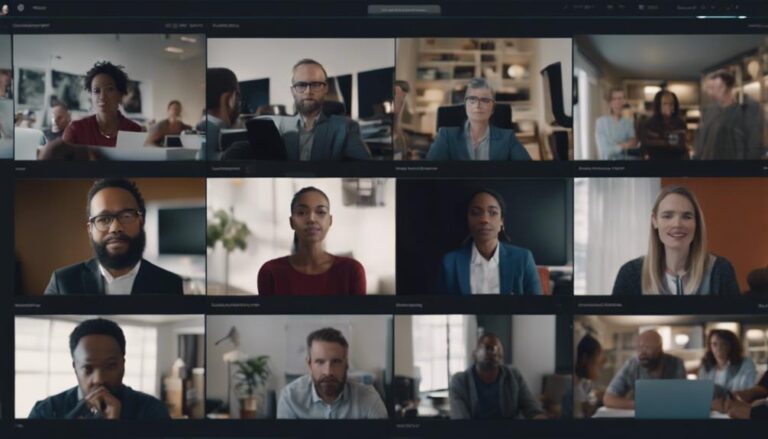Lifelong Learning for Remote Workers: Continuous Skill Development Strategies
To thrive as a remote worker, staying stagnant is not an option. Embracing a mindset of continuous learning is key to your professional success, but where do you start? By exploring innovative ways to hone your skills and adapt to the ever-changing landscape of remote work, you can position yourself as a valuable contributor in the digital era. Let's explore how lifelong learning can be your secret weapon in maneuvering the challenges of remote work and taking your career to new heights.
Key Takeaways
- Dedicate weekly time for learning new skills.
- Engage in online courses and webinars.
- Utilize self-assessment and peer feedback.
- Set SMART learning goals for progress tracking.
- Build a personal learning network for growth.
Importance of Lifelong Learning
Embracing lifelong learning is essential for remote workers to stay competitive and adaptable in today's rapidly evolving digital landscape. Continuous improvement isn't just a buzzword; it's a necessity for professional growth. As a remote worker, you must actively seek out opportunities to enhance your skills and knowledge continually.
To achieve continuous improvement, consider setting aside dedicated time each week for learning new technologies, tools, or methodologies relevant to your field. Engage in online courses, webinars, or workshops that can broaden your expertise and keep you up-to-date with industry trends.
Additionally, seek feedback from peers or mentors to identify areas where you can enhance your skills further. Professional growth hinges on your willingness to step out of your comfort zone and explore new horizons. Embrace challenges as opportunities for learning and development.
Identifying Skill Gaps
To improve your skill set effectively, start by utilizing skill assessment techniques to identify areas for growth.
Once you pinpoint your skill gaps, create personalized development plans to address them specifically.
This structured approach will help you focus your efforts on enhancing the skills that will benefit you the most in your remote work environment.
Skill Assessment Techniques
Effective skill assessment techniques play an important role in pinpointing areas where remote workers may have skill gaps that require development. Utilizing self-assessment strategies allows individuals to reflect on their own strengths and weaknesses, helping them identify areas where improvement is needed.
Peer feedback methods, on the other hand, provide valuable insights from colleagues or supervisors, offering a different perspective on one's skills.
Conducting a skills inventory involves listing the specific skills one possesses and comparing them to the skills required for their current role or future career aspirations. This inventory helps remote workers understand where they stand and what skills they need to acquire or enhance.
Competency mapping takes this a step further by systematically evaluating an individual's competencies against predetermined benchmarks or standards.
Personal Development Plans
Identifying skill gaps through personal development plans is an essential step in enhancing the capabilities of remote workers to meet the demands of their roles effectively. To kickstart this process, utilizing self-assessment techniques can provide valuable insights into areas that require improvement. By reflecting on your current skill set and comparing it to the skills needed for your role, you can pinpoint specific areas for growth.
Once these gaps are identified, it's vital to devise personal growth plans tailored to address them. This may involve setting clear goals, timelines, and actionable steps to acquire the necessary skills.
To bridge these skill gaps effectively, consider implementing skill enhancement strategies. This could include enrolling in online courses, attending virtual workshops, seeking mentorship, or participating in skill-building exercises. Additionally, seeking out professional development tips from industry experts or colleagues can offer valuable guidance on how to further develop your skills and excel in your remote work environment.
Setting Learning Goals
To maximize your skill development as a remote worker, setting clear and specific learning goals is crucial.
Utilize the SMART goal-setting framework to guarantee your objectives are Specific, Measurable, Achievable, Relevant, and Time-bound.
Implement progress tracking systems to monitor your advancements and make necessary adjustments to stay on course towards achieving your learning goals.
SMART Goal Setting
Crafting specific, measurable, achievable, relevant, and time-bound (SMART) learning goals is essential for remote workers to enhance their skill development effectively. When setting learning goals, remote workers must consider their time management skills to allocate dedicated time for learning amidst their work responsibilities. Efficient time management guarantees that learning activities are integrated into their routine without causing disruptions.
Additionally, self-motivation plays a vital role in goal achievement. Remote workers should cultivate a sense of internal drive and determination to stay focused on their learning objectives. By setting SMART goals that align with their personal aspirations and professional development needs, remote workers can enhance their skill sets progressively. To boost self-motivation, it's beneficial to break down larger goals into smaller milestones, celebrating achievements along the way.
With a combination of effective time management and self-motivation, remote workers can navigate their learning journey successfully, continuously improving their skills to adapt to the evolving demands of remote work environments.
Progress Tracking Systems
When setting learning goals for remote workers, implementing effective progress tracking systems is essential to guarantee continuous skill development. Performance evaluations and self-assessments play an important role in monitoring progress and identifying areas for improvement.
By regularly reviewing performance metrics and comparing them against set goals, remote workers can assess their development and make necessary adjustments to achieve continuous improvement.
Setting clear and measurable goals is just the first step; tracking progress ensures that these goals are being met effectively. Utilizing progress tracking systems allows remote workers to stay accountable and motivated, as they can visually see their advancements over time.
These systems not only provide insight into individual performance but also aid in identifying any obstacles that may hinder progress.
Continuous improvement is at the heart of goal setting, and progress tracking systems serve as the compass to navigate this journey effectively. By incorporating regular performance evaluations and self-assessments into the learning process, remote workers can stay on track towards achieving their skill development objectives.
Utilizing Online Learning Platforms
Consider incorporating online learning platforms into your continuous skill development strategy for remote workers to enhance their knowledge and expertise.
Virtual workshops and webinar series are excellent tools offered by various online platforms to help remote workers stay updated with the latest trends and information in their field.
These virtual workshops often provide interactive sessions where employees can engage with industry experts and peers, ask questions, and participate in hands-on activities.
Webinar series, on the other hand, offer a structured way to learn about specific topics or skills through online presentations and discussions.
Networking for Learning Opportunities
To further enrich your continuous skill development strategy for remote workers, explore networking opportunities that facilitate learning and growth within your industry. Engaging in virtual conferences can provide valuable insights and connections. These conferences offer a platform to interact with industry leaders, participate in discussions, and stay updated on the latest trends. Additionally, connecting with professionals on LinkedIn can open doors to new learning opportunities. By building a network of like-minded individuals, you can exchange knowledge, seek advice, and discover potential collaborations.
Peer mentorship is another effective way to enhance your skills. Establishing relationships with experienced colleagues who can offer guidance and support can greatly benefit your professional development.
Participating in industry webinars is also a valuable networking tool. These webinars often feature experts sharing their knowledge and best practices, allowing you to gain new perspectives and stay informed about industry advancements. By actively engaging in these networking opportunities, you can create a supportive learning environment that fosters continuous growth and development.
Implementing Microlearning Techniques
Explore how incorporating microlearning techniques can enhance the continuous skill development of remote workers by delivering targeted, bite-sized learning modules that promote quick absorption and retention of knowledge. Microlearning breaks down complex topics into easily digestible chunks, making it ideal for remote workers with busy schedules.
By offering short, focused lessons, remote workers can engage with the material more effectively, leading to improved skill retention. Bite-sized learning modules cater to remote workers' preferences for quick, on-the-go learning, allowing them to fit in learning moments throughout their day. This flexibility encourages continuous improvement as employees can access relevant information when needed.
The interactive nature of microlearning also boosts remote engagement by providing opportunities for active participation and immediate application of new skills. To secure the success of microlearning initiatives, it's essential to align the content with employees' skill development goals. By tailoring bite-sized lessons to address specific competencies, remote workers can make tangible progress in their professional growth journey.
Continuous reinforcement through microlearning helps solidify knowledge, making it a valuable tool for ongoing skill enhancement in remote work settings.
Tracking Progress and Reflecting
Tracking progress and reflecting on your learning journey are essential components of enhancing continuous skill development for remote workers. Self-reflection allows you to assess what you have learned, how you have grown, and what areas may need further attention.
Goal tracking, on the other hand, enables you to measure your progress towards specific objectives, keeping you motivated and on track.
To effectively track your progress, establish clear and measurable goals aligned with your skill development objectives. Regularly assess your achievements against these goals, adjusting your learning strategies as needed. Reflect on your successes and failures, identifying patterns that can guide your future learning endeavors.
Consider keeping a learning journal to document your progress, insights, and areas for improvement.
Furthermore, leverage technology tools such as project management software, online learning platforms, or productivity apps to track your learning milestones and goals. Engage in regular self-assessment exercises to evaluate your skill development progress objectively.
Building a Personal Learning Network
Through fostering connections with professionals in your industry, you can strategically build a personal learning network to enhance your continuous skill development as a remote worker.
Networking strategies play an essential role in this process. Start by actively engaging with colleagues on professional platforms like LinkedIn, attending virtual industry events, and participating in online communities related to your field. Building connections with like-minded individuals can provide opportunities for knowledge-sharing and collaboration.
Online communities and learning circles offer valuable resources for expanding your network. Joining specialized groups or forums can expose you to diverse perspectives and insights, fostering a culture of continuous learning. Actively contribute to discussions, seek advice, and offer support to establish meaningful relationships within these virtual spaces.
Conclusion
As a remote worker, continuously honing your skills through lifelong learning is imperative for staying competitive in today's dynamic work environment. By identifying and addressing skill gaps, setting clear learning goals, utilizing online platforms, networking for opportunities, implementing microlearning techniques, and tracking your progress, you can build a robust personal learning network.
Embrace the juxtaposition of self-directed growth and collaborative learning to excel in your career and adapt to the ever-changing demands of the remote work landscape.







